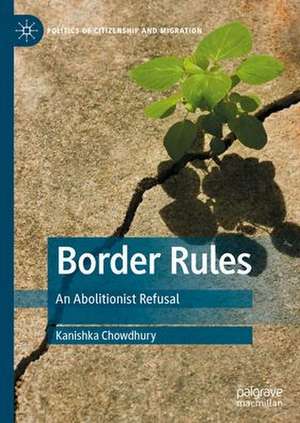Border Rules: An Abolitionist Refusal: Politics of Citizenship and Migration
Autor Kanishka Chowdhuryen Limba Engleză Hardback – 27 apr 2023
| Toate formatele și edițiile | Preț | Express |
|---|---|---|
| Paperback (1) | 737.33 lei 38-44 zile | |
| Springer Nature Switzerland – 28 apr 2024 | 737.33 lei 38-44 zile | |
| Hardback (1) | 783.20 lei 6-8 săpt. | |
| Springer Nature Switzerland – 27 apr 2023 | 783.20 lei 6-8 săpt. |
Preț: 783.20 lei
Preț vechi: 955.11 lei
-18% Nou
Puncte Express: 1175
Preț estimativ în valută:
149.88€ • 155.59$ • 124.98£
149.88€ • 155.59$ • 124.98£
Carte tipărită la comandă
Livrare economică 24 martie-07 aprilie
Preluare comenzi: 021 569.72.76
Specificații
ISBN-13: 9783031262159
ISBN-10: 3031262158
Pagini: 256
Ilustrații: XIII, 256 p. 3 illus. in color.
Dimensiuni: 148 x 210 mm
Greutate: 0.48 kg
Ediția:2023
Editura: Springer Nature Switzerland
Colecția Palgrave Macmillan
Seria Politics of Citizenship and Migration
Locul publicării:Cham, Switzerland
ISBN-10: 3031262158
Pagini: 256
Ilustrații: XIII, 256 p. 3 illus. in color.
Dimensiuni: 148 x 210 mm
Greutate: 0.48 kg
Ediția:2023
Editura: Springer Nature Switzerland
Colecția Palgrave Macmillan
Seria Politics of Citizenship and Migration
Locul publicării:Cham, Switzerland
Cuprins
Chapter 1: Border Rules and Oppositional Currents.- Chapter 2: Border Rules: Imperialism, Race, and the Politics of Development.- Chapter 3: Theorizing Borders in the Shadow of Imperial Violence.- Chapter 4: Theorizing Borders in the Shadow of Imperial Violence.- Chapter 5: Documenting the Migrant Journey in Ai Weiwei’s Human Flow and Diego Quemada-Díez’s La Jaula de Oro.- Chapter 6: Visualizing Borders: M.I.A.’s “Borders” and Mural Art in Cuidad Juárez and El Paso.- Chapter 7: A Borderless World: Abolition Democracy and the Politics of Refusal Abolition and Solidarities Across Borders.
Notă biografică
Kanishka Chowdhury is Professor of English and Director of the American Culture and Difference Program at the University of Saint Thomas in Saint Paul, Minnesota, where he teaches courses in cultural studies, transnational literatures, and contemporary film. His most recent book is Human Rights Discourse in the Post-9/11 Age (2019).
Textul de pe ultima copertă
“At once sharp and dialectical, theoretically sophisticated and crystal-clear, Chowdhury's book addresses an issue of great relevance to current historical developments and questions of social justice. It should appeal not just to academics but also to many others trying to understand one of the most critical issues of our time.”
—Barbara Foley, Emerita Distinguished Professor of English, Rutgers University-Newark,USA
“Chowdhury’s finest book to date, Border Rules masterfully analyzes “the border” as a social relation situated within the uneven histories of capital accumulation, surplus populations, imperial violence, and the disciplinary capacities of the nation state. Acutely attentive to contradictions and abolitionist openings, the book is essential reading for anyone interested in contemporary border struggles.”
—Bret Benjamin,SUNY, Albany, USA
This book examines both border policies and oppositional narratives of “the border,” 2011–2021, demonstrating that the term designates not merely a line of territorial control but also a set of social relationsshaped by persistent, racially differentiated colonial structures and, more recently, by neoliberal modes of accumulation. These relations are shown to determine access to wealth and/or resources and to enable the management of labor, the extraction of surplus, and the accumulation of capital. Discussion in the book is informed by the history of these policies and by the critical literature on borders. Various cultural texts focusing on two border zones—the US–Mexico and the EU–Southern Mediterranean—are analyzed: specifically, two novels, two films, and two murals examined in conjunction with a music video. A path to a borderless future is suggested: an abolitionist refusal of border rules with an insistence on the necessity of abolition.
Kanishka Chowdhury is Professor of English and Director of the American Culture and Difference Program at the University of Saint Thomas in Saint Paul, Minnesota, where he teaches courses in cultural studies, transnational literatures, and contemporary film. His most recent book is Human Rights Discourse in the Post-9/11 Age (2019).
—Barbara Foley, Emerita Distinguished Professor of English, Rutgers University-Newark,USA
“Chowdhury’s finest book to date, Border Rules masterfully analyzes “the border” as a social relation situated within the uneven histories of capital accumulation, surplus populations, imperial violence, and the disciplinary capacities of the nation state. Acutely attentive to contradictions and abolitionist openings, the book is essential reading for anyone interested in contemporary border struggles.”
—Bret Benjamin,SUNY, Albany, USA
This book examines both border policies and oppositional narratives of “the border,” 2011–2021, demonstrating that the term designates not merely a line of territorial control but also a set of social relationsshaped by persistent, racially differentiated colonial structures and, more recently, by neoliberal modes of accumulation. These relations are shown to determine access to wealth and/or resources and to enable the management of labor, the extraction of surplus, and the accumulation of capital. Discussion in the book is informed by the history of these policies and by the critical literature on borders. Various cultural texts focusing on two border zones—the US–Mexico and the EU–Southern Mediterranean—are analyzed: specifically, two novels, two films, and two murals examined in conjunction with a music video. A path to a borderless future is suggested: an abolitionist refusal of border rules with an insistence on the necessity of abolition.
Kanishka Chowdhury is Professor of English and Director of the American Culture and Difference Program at the University of Saint Thomas in Saint Paul, Minnesota, where he teaches courses in cultural studies, transnational literatures, and contemporary film. His most recent book is Human Rights Discourse in the Post-9/11 Age (2019).
Caracteristici
Considers political borders as a set of capitalist social relations Analyzes both border policies and oppositional narratives of “the border” Makes a case for an abolitionist refusal of borders












